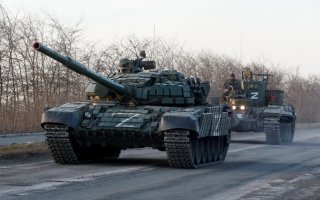Mariupol Mayor Says Russia Has Turned the City Into a ‘Death Camp’
According to accounts of Mariupol residents, witnesses to alleged atrocities were sequestered in so-called “filtration camps” before being taken to Russia.
The Mariupol City Council on Wednesday accused Russian forces of using a mobile crematorium to cover up their alleged war crimes in the southeastern port city.
"The killers are covering their tracks," read one of the city council’s posts on social media. “Russia’s top leadership ordered the destruction of any evidence of crimes committed by its army in Mariupol," the council said, adding that Russian forces are using “mobile crematoriums” in Mariupol. The local officials did not immediately provide evidence in support of their claims.
"The world has not seen the scale of the tragedy in Mariupol since the existence of the Nazi concentration camps. Russia-occupation forces turned our entire city into a death camp," said Mariupol’s pro-government mayor, Vadym Boychenko. "This is the new Auschwitz and Majdanek. … The world must help punish Putin's monsters.”
According to accounts of Mariupol residents, witnesses to alleged atrocities were sequestered in so-called “filtration camps” before being taken to Russia. “People need to know the truth, that Ukrainians are being moved to Russia, the country that is occupying us,” said a woman hiding in a Mariupol suburb, according to the Guardian. Moscow is conducting what it refers to as evacuations from Mariupol to Russia, but it has denied Ukrainian allegations that locals are being taken to Russia against their will. The United Nations General Assembly voted on Thursday to suspend Russia from the Human Rights Council, citing the council’s "grave concern" over allegations of "gross and systematic violations and abuses of human rights" and "violations of international humanitarian law" by Russian forces. Russian forces stormed Mariupol in late March following an ultimatum from the Kremlin for the city’s defenders—composed mainly of the ultranationalist Azov Battalion—to lay down their arms in exchange for safe passage out of the city. The invading forces, composed largely of Chechen fighters and pro-Russian separatist troops from the Donetsk People’s Republic (DPR), reportedly took most of the city within the span of several days, dividing the remnants of Azov into pockets concentrated in Mariupol’s southern districts. The Ukrainian military is not in a position to relieve the city; Russia has successfully cut Ukraine off from the neighboring Azov Sea, and Ukraine’s forces are separated from Mariupol by the Russian-held southern cities of Berdyansk and Melitopol. The Donetsk separatists have already begun forming a Russian-aligned city administration in Mariupol, with Denis Pushilin, head of the DPR, ordering the appointment of new district heads last week.
Mark Episkopos is a national security reporter for the National Interest.
Image: Reuters.

